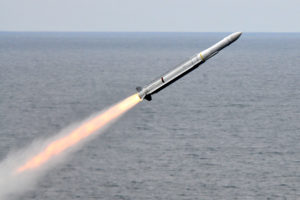by WorldTribune Staff, October 12, 2016
A U.S. Navy guided-missile destroyer fired three missiles to intercept an incoming cruise missile fired by Iran-backed Houthi rebels in Yemen, according to a report.
One of the missiles fired by the USS Mason during the Oct. 9 incident was used for the first time in a combat situation.

The Mason fired the missiles to defend the guided-missile destroyer and the nearby USS Ponce from two suspected cruise missiles fired from the Yemini shore, defense officials told U.S. Naval Institute News (USNI).
USNI on Oct. 11 said the Mason fired two SM-2 missiles and a single Evolved Sea Sparrow Missile (ESSM). The ship also used its Nulka anti-ship missile decoy.
“It might be the first time the SM-2 was used against an actual threat for which it was designed,” Bryan Clark, a naval analyst at the Center for Strategic and Budgetary Assessments, said.
“It’s definitely the first time ESSM has been used… This is obviously a huge deal.”
Clark said the SM-2s – more than two decades old – were specifically designed defend against Cold War cruise missile threats to a guided-missile destroyer, much like the ones Iran is said to have given to the Houthis in Yemen.
One defense official said the missile fired by the Houthis may have been a “Silkworm,” a Chinese-made weapon that has been part of the Iranian military’s arsenal for decades.
The USS Mason was operating in international waters north of the strait of Bab el-Mandeb at the time of the attack on Oct. 9. The crew of the ship was uncertain if the suspected cruise missile was taken out by an SM-2 or went into the water on its own.
A second Houthi missile was fired from a similar location in Yemen about one hour later, but it did not pose a threat to the U.S. ships and warrant defensive fire, U.S. officials said.
“Anybody who takes action, fires against U.S. Navy ships operating in international waters, does so at their own peril,” Pentagon spokesman Navy Capt. Jeff Davis said. “We’re going to find out who did this and we will take action accordingly.”
Davis said the incident is being reviewed “up and down the chain of command.”
Last week a Houthi-launched cruise missile caused significant damage to the UAE-leased HSV Swift – an unarmed aluminum high-speed transport vessel used to move supplies and wounded in the region, UAE officials said. UAE is part of a Saudi Arabia led coalition that has fought against the Iran-backed Houthis in Yemen since last year.
